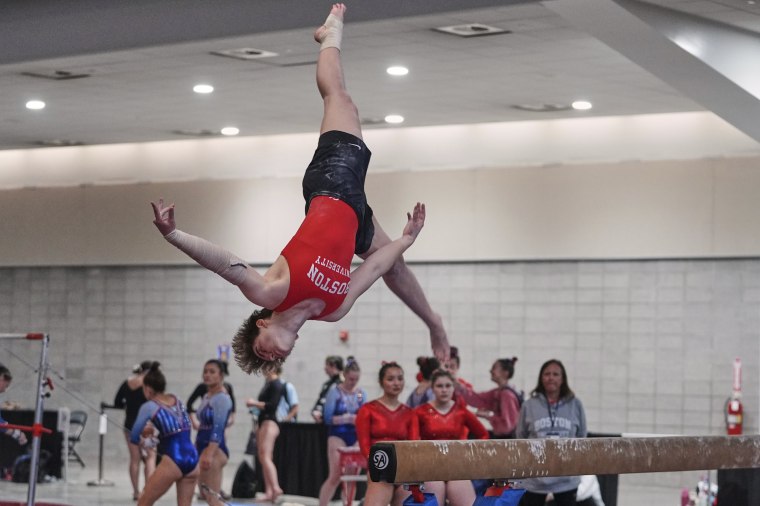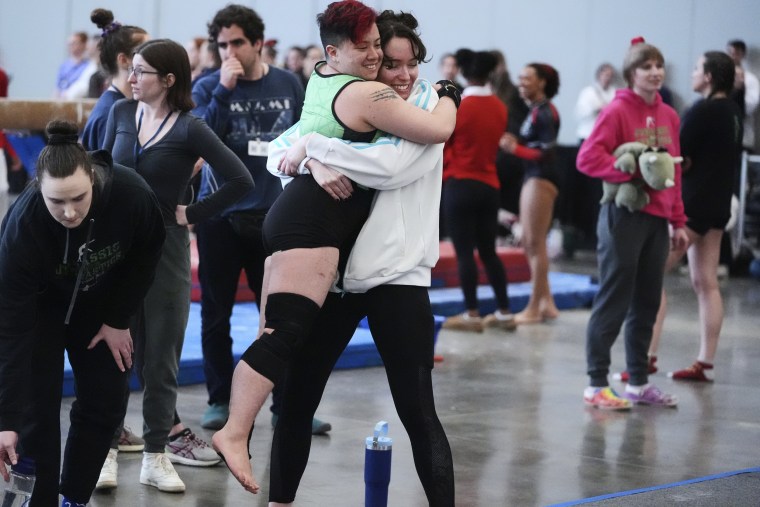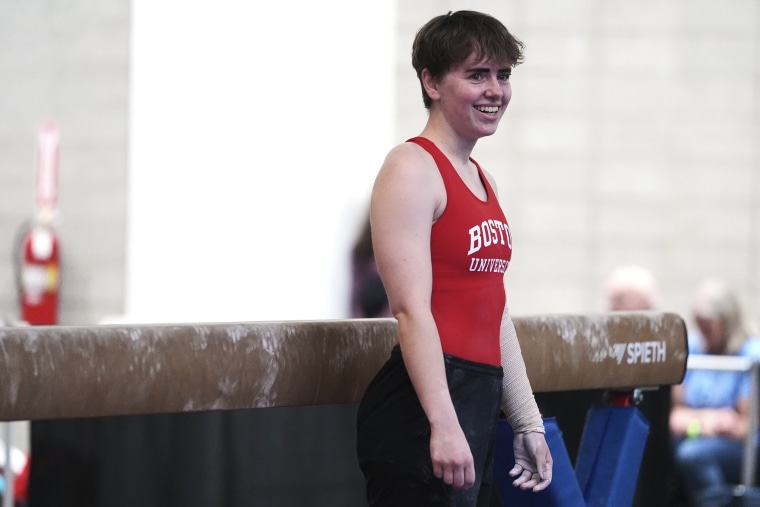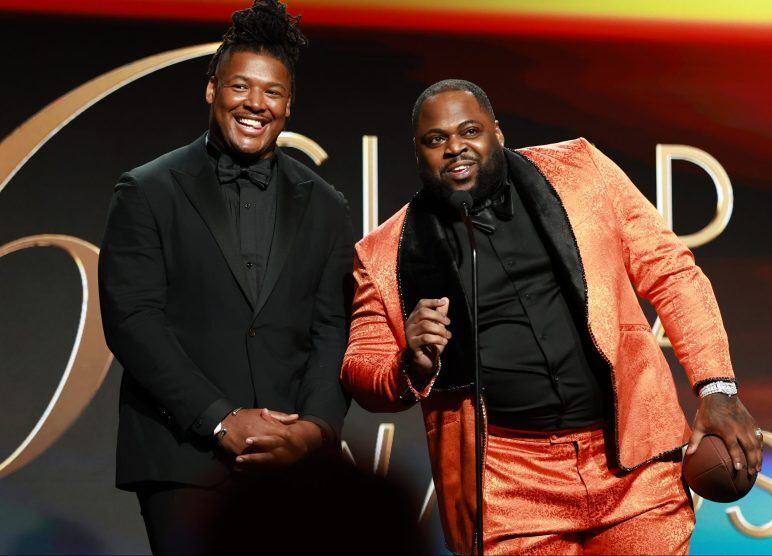Trans athletes are under more scrutiny than ever. Some have found a safe space in gymnastics.
Raiden Hung, of Jurassic Gymnastics in Boston, relaxes after competing on the uneven bars at the NAIGC national competition in Pittsburgh on Friday.Gene J. Puskar / AP
PITTSBURGH — Raiden Hung can’t imagine a life without gymnastics. And to be honest, he doesn’t want to.
There’s always been something about the sport that’s called to him. Something about flipping. Something about the discipline it requires. Something about the mixture of joy and calm he feels whenever he steps onto a mat.
“It keeps me sane, I guess,” the 21-year-old student at Northeastern University in Boston said. “Gymnastics is the love of my life basically.”
The hours in the gym have long served as a constant for Hung. The one thing he can always depend on. The one place where he can truly feel like himself.
Still, Hung feared he would be forced to give up gymnastics when he realized in his late teens that he was nonbinary. He had identified as female most of his life and competed in women’s events growing up. He says he now identifies as trans-masculine.
Part of Hung’s transition included beginning hormone replacement therapy, something he considered putting off over worries that it meant he would no longer be able to compete.
“It was sort of like, ‘Do I have to make a choice?’” Hung said. “And that would have probably been awful for my mental stability, like having to choose between the two.”
The National Association of Intercollegiate Gymnastics Clubs gave Hung safe harbor. The stated mission of the steadily growing organization that includes more than 2,500 athletes and 160 clubs across the country is to provide a place for college and adult gymnasts to continue competing while “pushing the boundaries of the sport.”

That includes, but is hardly limited to, being as gender-inclusive as possible.
During local NAIGC meets, for example, there are no gender categories. Athletes compete against every other athlete at their designated skill level, which can run from novice/developmental routines to ones that wouldn’t look out of place at an NCAA Division I meet.
Gymnasts can also hop on whatever apparatus they want. Women on parallel bars. Men on the balance beam. Just about anything goes. At its annual national meet, the NAIGC even offers the “decathlon,” which allows athletes of all gender identities to compete against each other across all 10 disciplines — six in men’s, four in women’s — of artistic gymnastics.
“(We want) people to be able to continue doing gymnastics into adulthood in a way that feels comfortable and safe and supportive for them,” said Ilana Shushanky, NAIGC’s director of operations.
A challenging climate
The approach comes as transgender athletes find themselves the target of increasingly heated rhetoric.
President Donald Trump signed an executive order in February that gave federal agencies wide latitude to ensure entities that receive federal funding abide by Title IX in alignment with the Trump administration’s view, which interprets “sex” as the gender someone was assigned at birth. A day later, the NCAA said it would limit competition in women’s sports to athletes who were assigned female at birth.
The message to the transgender community at large was clear: You do not belong here. Several trans and/or nonbinary members of the NAIGC, which is independently run and volunteer-led and does not rely on federal money to operate, felt it.
Multiple trans or nonbinary athletes who spoke to The Associated Press said they pondered quitting following last fall’s election, despondent over what at times feels like an increasingly hostile environment toward their community.
None did. One viewed stepping away as ceding power over a part of who they are to someone else. Another pointed to the social aspect of gymnastics and how vital the feeling of acceptance in their home gym was to maintaining proper mental and emotional health.
“Part of my identity is as an athlete and to see myself as strong and able to do hard things,” said Wes Weske, who is nonbinary and previously competed in the decathlon before recently graduating from medical school. “I think (gymnastics) really helped my self-image and was just an important part of understanding myself.”
A sense of normalcy
That sense of belonging was everywhere at the NAIGC’s national competition in early April. For three days, more than 1,700 athletes, including a dozen who registered their gender as “other,” turned a convention center hall in downtown Pittsburgh into what could best be described as a celebration.
Not just of gymnastics. But of diversity. And inclusion. It all looked and felt and sounded like any other large-scale meet. Cheers from one corner following a stuck dismount. Roars from another corner encouraging a competitor to hop back up after a fall.

For Hung and the 11 “other” competitors allowed to choose whether to compete in the men’s or women’s divisions, nationals provided the opportunity to salute the judges and stand alongside their teammates while being seen for who they really are.
When Hung dismounted from his uneven bars routine, several members of Jurassic Gymnastics, the all-adult competitive team based in Boston that Hung joined, came over to offer a hug, pep talk or both.
The group included Eric Petersen, a 49-year-old married father of two teenagers who competed on the men’s team at the Air Force Academy 30 years ago. He now dabbles in women’s artistic gymnastics alongside Hung at Jurassic.
“Certain people want to convince people that this is a big issue and people are losing their (minds),” Petersen said. “But it’s not like that. Other groups can be uptight about that if they want. But in this group, it’s about the love of the sport. If you love the sport, then do the sport and have fun, no matter who you are.”
Finding their way
Ten Harder got into gymnastics after being inspired by watching Gabby Douglas win gold at the 2012 Olympics. They spent their childhood competing as a woman but became increasingly uncomfortable at meets as they grew older.

Harder, 22, now a Ph. D. student at Boston University who identifies as nonbinary/trans masculine, felt like they had to make their own path. They connected on TikTok with a nonbinary gymnast from the Netherlands and started competing in a uniform that felt more natural, a practice leotard similar to a tank top and shorts. Over the last couple of years, they have run across other nonbinary or queer athletes, easing their sense of loneliness.
While there are times Harder admits they still grapple with feeling self-conscious about their gender identity even around teammates who have become friends and allies, there is also something greater at play.
“I think it’s important to remember that trans athletes are just people, too,” he said. “We deserve to be in the sports that we love. And we deserve to get a chance to compete and do everything just as other people do.”
